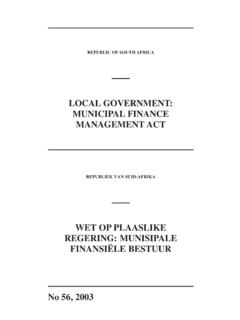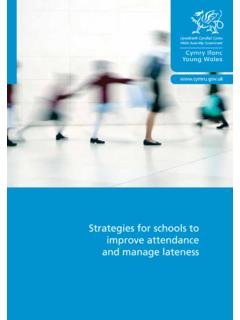Transcription of MFMA Circular No 68 Municipal Finance Management Act No ...
1 MFMA Circular No 68 Unauthorised, irregular , Fruitless and Wasteful expenditure October 2021 (updated October 2021 for use during the 2021/22 financial year) Page 1 of 21 Unauthorised, irregular , Fruitless and Wasteful expenditure The purpose of this Circular is to provide clarity on the procedures when dealing with unauthorised, irregular , fruitless and wasteful expenditure (UIFW) as per the Municipal Finance Management Act, 2003 (MFMA). It will be updated from time to time. Municipalities are organs of state within the local sphere of government that collect monies from the public in the form of rates, levies, surcharges, fees and service charges, receive grants from national and provincial government, invest surplus cash and borrow for capital expenditure for long-term purposes or bridging Finance for short term needs.
2 These resources are appropriated by Council for the purpose of fulfilling its powers and functions, primarily to deliver services, in accordance with their mandate as set out in sections 151,153 and 156 of the Constitution. In terms of section 4(2)(a) of the Municipal Systems Act, (MSA) the council has a duty to use the resources of the municipality in the best interest of the local community. This duty is extended to individual councillors through the Code of Conduct for Councillors, which states that a councillor must: i. perform the functions of office in good faith, honestly and in a transparent manner, and ii.
3 At all times act in the best interests of the community and in such a way that the credibility and integrity of the municipality are not compromised. Equally the Accounting Officer and other officials have specific responsibilities in terms of the MFMA. The Auditor-General has highlighted an escalating trend in unauthorised, irregular , fruitless and wasteful expenditure in municipalities over recent years. At the same time, some municipalities were uncertain about how UIFW expenditure should be treated and who has the legislative power to deal with such matters, the process to be followed and the manner in which expenditure should be recorded and disclosed in the annual financial statements.
4 This Circular aims to provide clarity in this regard and to create a common understanding on the process to be followed in dealing with these categories of expenditure . In order to assist officials and councillors, annexures A to D provide information that supports the effective implementation in addressing UIFW. This is also illustrated in the attached flowchart, (Annexure C), which sets out a step-by-step process to assist municipalities in dealing with irregular expenditure and also reduce the extent of historical irregular expenditure prior to the commencement of the next audit cycle.
5 It requires proactive closer in-year monitoring, recommendations to be processed and actions to be taken by the Administration and Council. MFMA Circular No 68 Municipal Finance Management Act No. 56 of 2003 N A T I O N A L T R E A S U R Y MFMA Circular No 68 Unauthorised, irregular , Fruitless and Wasteful expenditure October 2021 (updated October 2021 for use during the 2021/22 financial year) Page 2 of 21 The Circular is supported by a Register (Annexure A) which will assist municipalities in recording, keeping track and managing the categories of expenditure mentioned above in a more transparent and accountable manner.
6 The Register will be a central source of information concerning the UIFW expenditure incurred for Council and relevant external stakeholders, by clearly recording the details of the transaction, the type of expenditure , the person liable for the expenditure and what measures were taken by the municipality to address the matter. Each Council has a duty to introduce and adopt policies and processes to: a) Prevent unauthorised, irregular , fruitless and wasteful expenditure ; b) Identify and investigate unauthorised, irregular , fruitless and wasteful expenditure ; c) Respond appropriately in accordance with the law; d) To address identified instances of unauthorised, irregular , fruitless and wasteful expenditure conclusively, as required by section 32 of the MFMA; and e) Implement consequence Management where instances require.
7 Defining unauthorised, irregular , fruitless and wasteful expenditure Unauthorised expenditure Unauthorised expenditure is defined in section 1 of the MFMA as follows: unauthorised expenditure , in relation to a municipality, means any expenditure incurred by a municipality otherwise than in accordance with section 15 or 11(3), and includes (a) overspending of the total amount appropriated in the municipality s approved budget; (b) overspending of the total amount appropriated for a vote in the approved budget; (c) expenditure from a vote unrelated to the department or functional area covered by the vote; (d) expenditure of money appropriated for a specific purpose, otherwise than for that specific purpose; (e) spending of an allocation referred to in paragraph (b), (c) or (d) of the definition of allocation otherwise than in accordance with any conditions of the allocation; or (f) a grant by the municipality otherwise than in accordance with this Act.
8 Section 15 of the MFMA deals with appropriation of funds for expenditure and provides that a municipality may, except where otherwise provided in the MFMA, incur expenditure only in terms of an approved budget and within the limits of the amounts appropriated for the different votes in an approved budget. With reference to MFMA section 1(a) in the definition above, a municipality s budget is divided into an operational budget and a capital budget. Overspending must be determined in relation to both the operational budget and the capital budget. MFMA Circular No 68 Unauthorised, irregular , Fruitless and Wasteful expenditure October 2021 (updated October 2021 for use during the 2021/22 financial year) Page 3 of 21 With reference to MFMA section 1(b) a municipality s operational and capital budgets are divided into votes which represent those components of the budget that have amounts appropriated for the financial year, for different departments or functional areas.
9 The Municipal Budget and Reporting Regulations (MBRR) prescribe the structure and formats of Municipal budgets, including votes, in Tables A1 to A10. Votes are informed by Table A3 (Budgeted Financial Performance: revenues and expenditure by Municipal vote) and Table A5 (Budgeted Capital expenditure by vote, standard classification and funding). Budget Table A4 (Budgeted Financial Performance: revenue and expenditure ) by implication is approved by the council and as such must also be taken into consideration when determining unauthorised expenditure . In other words, when considering unauthorised expenditure from an operating budget point of view, both Table A3 and A4 (read in conjunction with the supporting table SA1) of the MBRR would have to be considered.
10 Overspending must also be determined in relation to each of the votes on both the operational budget and the capital budget. Where Council has approved a virement policy that allows the accounting officer to make limited shifts of funds between votes, this must also be considered. With reference to MFMA section 1(c) funds appropriated in a vote for a department may not be used for purposes unrelated to the functions of that department. In other words, an accounting officer or other official may not use funds allocated to one department for purposes of another department or for purposes that are not provided for in the budget.
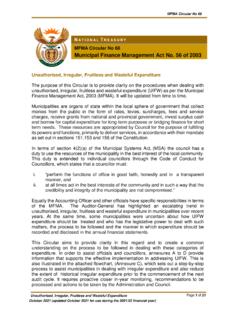




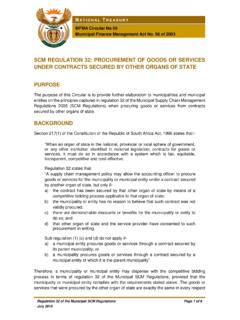





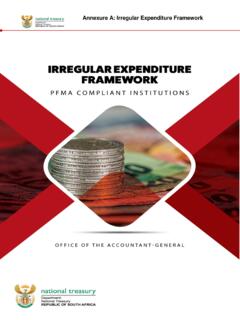
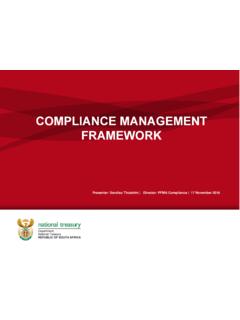
![Public Audit Act [No. 25 of 2004] - Gov](/cache/preview/d/e/4/d/c/b/9/8/thumb-de4dcb982923f9470777b963db2987ca.jpg)
